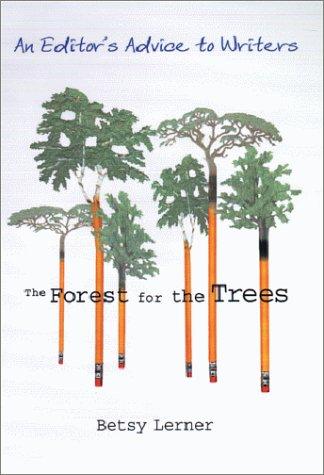In 1999, The Forest for the Trees: An Editor’s Advice to Writers by Betsy Lerner, emerged as a beacon of hope and practical guidance for aspiring and struggling writers. Lerner, a seasoned editor with a keen understanding of the publishing world, doesn’t just offer dry advice; she delves into the emotional and psychological minefield that writers often navigate. It is a book that remains relevant because the core anxieties and challenges of the writing life are timeless, making it just as crucial today as it was two decades ago. Its enduring appeal lies in its ability to offer both tough love and profound empathy, making it a must-read for anyone serious about the craft. This book has had a lasting impact, and continues to be a go-to resource. Find it on Amazon here.
Lerner’s approach is what sets The Forest for the Trees apart. Instead of focusing solely on the mechanics of writing, she addresses the underlying issues that often hinder a writer’s progress: self-doubt, procrastination, and the fear of rejection. She acknowledges that writing is not merely a technical skill, but also a deeply personal and often painful process. Her analysis is not academic but practical, drawing on her own experiences and her years of observing writers in the trenches. The book’s structure is straightforward, moving from the initial stages of drafting to the final stages of publication, and her use of anecdotes and case studies makes it accessible and relatable. For example, she explores the writer’s relationship with their inner critic, which she personifies as a “saboteur,” a concept that is both insightful and humorous.
One of the key strengths of Lerner’s book is her candid exploration of the writer-editor relationship. She demystifies the often-opaque process of publishing, showing writers what editors really look for and how they can work more effectively with their editors. She explains the difference between developmental editing and copy editing, and why both are essential to bringing a manuscript to its full potential. She uses real-world examples, demonstrating how feedback can be turned into a positive force for improvement, rather than a source of discouragement. This section of the book alone is invaluable, as it reveals the mechanics of publishing in a way that most writing guides tend to overlook. The book’s honest approach to the less glamorous aspects of the writing process makes it an essential read for anyone navigating the challenges of becoming a published author. Click here to purchase.
Lerner’s writing style is engaging and conversational. She avoids academic jargon, making her advice easy to digest. Her tone is both encouraging and firm, offering a blend of compassion and straightforwardness that is refreshing. She uses humor to lighten the mood, particularly when discussing the more challenging aspects of the writing life, like dealing with writer’s block or rejection. This light touch prevents the book from becoming overly serious or didactic. Furthermore, her use of vivid metaphors and relatable examples makes the book not only informative but also a genuine pleasure to read. She writes as if she’s right there with you, walking beside you on your writing journey.
The emotional resonance of The Forest for the Trees is undeniable. I found myself nodding in recognition countless times as Lerner described the internal struggles I’ve faced as a writer. Her insights into the psychology of writing—the fear of failure, the desire for validation, and the difficulty of staying motivated—hit home on a personal level. She validates the emotional rollercoaster that writers experience, and this validation is a large part of the book’s appeal. I felt like I was not alone in my struggles, and that, perhaps, these struggles are part and parcel of the process. Her book isn’t just about writing; it’s about understanding yourself as a writer, flaws and all. You can find it here.
The practical applications of Lerner’s advice are numerous. She provides concrete tips on how to organize your time, set realistic goals, and handle criticism. Her advice on revision, in particular, is incredibly useful. She encourages writers to view revision not as punishment but as an opportunity to improve their work. She breaks down the revision process into manageable steps, helping writers to approach it with a sense of purpose and clarity. This actionable advice transforms the often overwhelming task of rewriting into something manageable. Her strategies are not just theoretical; they are grounded in the realities of the writing process.
The Forest for the Trees is not just a book for writers; it’s a book for anyone engaged in a creative endeavor. The lessons on perseverance, self-discipline, and the importance of constructive feedback are universally applicable. It’s a book that empowers you to navigate the challenges of any creative pursuit with greater confidence and understanding. It encourages you to embrace your vulnerabilities and to see them as strengths. This message of resilience and self-acceptance makes the book an inspiring read, regardless of your profession. It offers a sense of solidarity to those who pour their hearts into their work.
In conclusion, The Forest for the Trees is an indispensable guide for writers at all stages of their journey. It is more than just a how-to manual; it’s a compassionate and insightful look at the psychology of the writing life. Betsy Lerner’s voice is both authoritative and comforting, making this book an engaging and empowering read. It’s a book that stays with you long after you’ve finished reading it. I recommend it not only to writers but to anyone interested in the creative process and the emotional landscape of making art. If you’re looking for similar books, you might enjoy Natalie Goldberg’s *Writing Down the Bones* or Anne Lamott’s *Bird by Bird*, both of which offer similar blends of practical advice and personal insights into the writing process. This is a book that should be on every writer’s bookshelf, to be returned to time and time again. Pick up your copy here.

